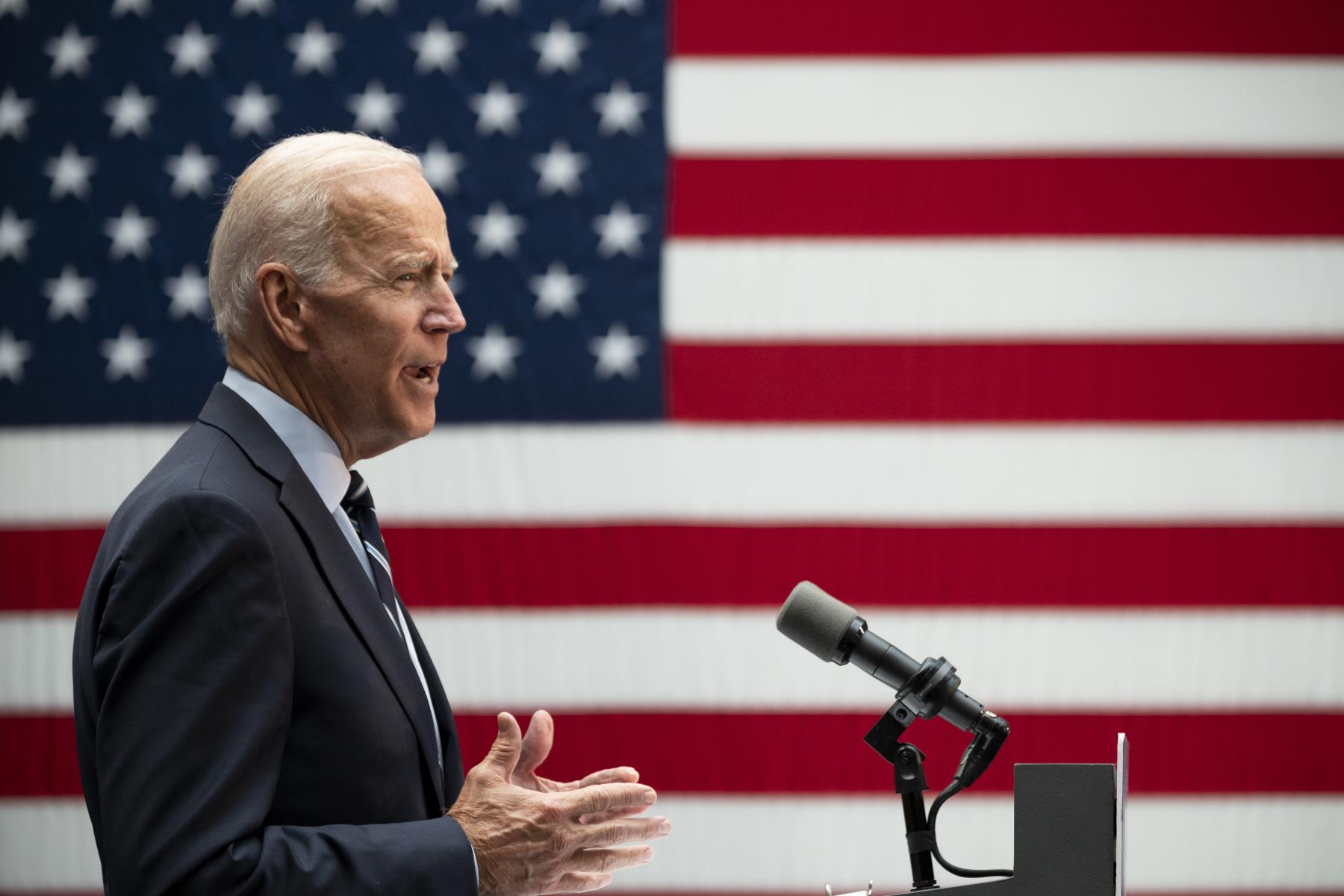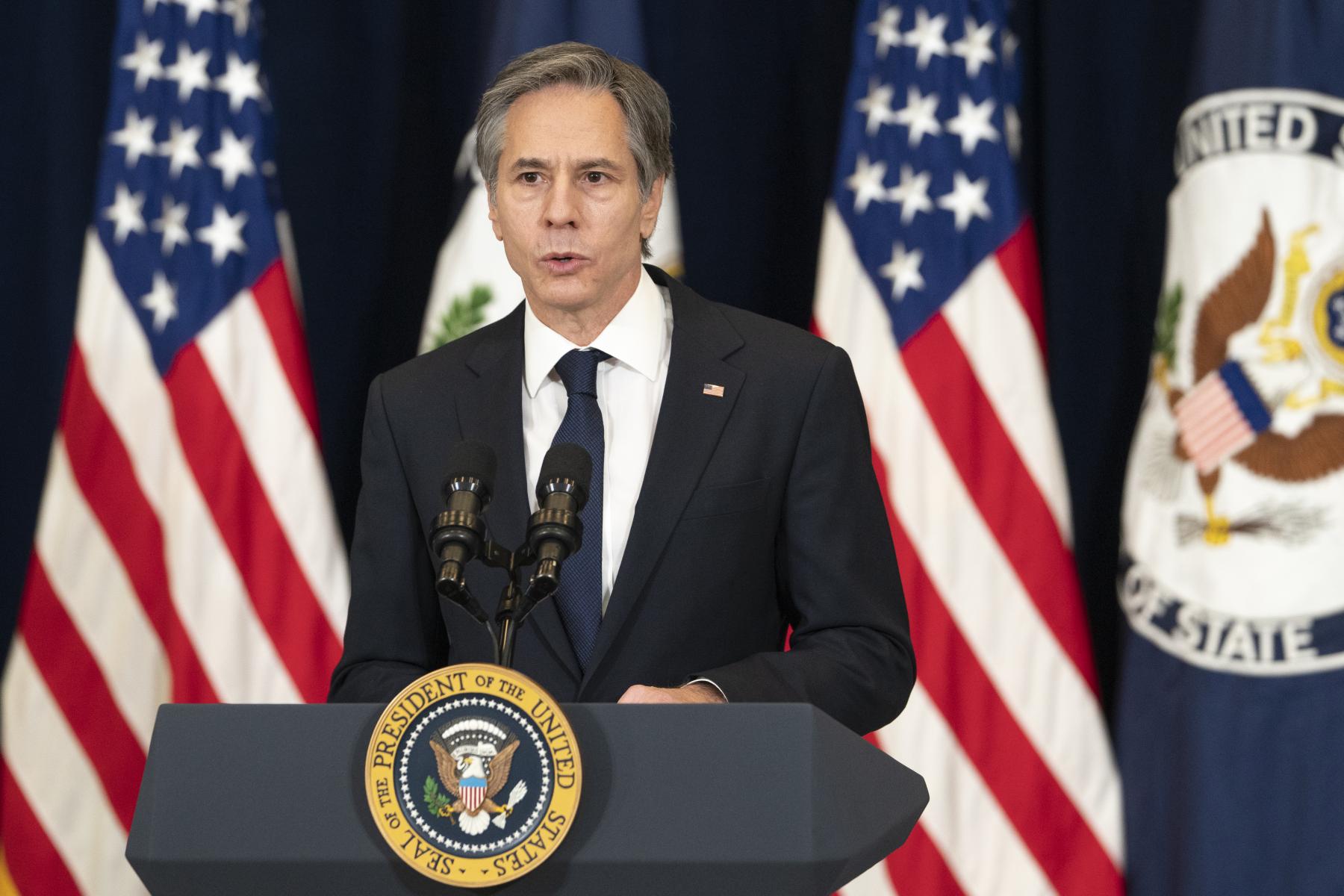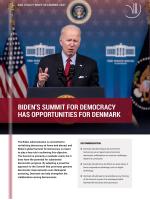Biden's Summit for Democracy has opportunities for Denmark
- Denmark should embrace the Summit for Democracy as an opportunity to promote democratic collaboration on common challenges beyond its conclusion.
- Denmark should focus its efforts on areas where it has a comparative advantage, such as digital technology.
- Denmark should seek to de-emphasize any framing of the Summit as part of an ideological battle between democracies and autocracies
The Biden administration has made it clear that strengthening and securing democracy at home and abroad is a core objective of US foreign policy. This has been made evident in key speeches by Joe Biden himself, senior administration officials and the Interim National Security Strategic Guidance, which lists ‘realizing and defending the democratic values at the heart of the American way of life’ as a vital national security priority. The inclusion of several long-term democracy advocates in Biden’s foreign-policy team suggests that this commitment is sincere.
The administration’s commitment to revitalizing democracy is driven by two interlinked developments. At home, the United States is troubled by serious problems with its democracy, which has led independent studies to downgrade it to the status of a ‘flawed democracy.’ The attack on the US Capitol on 6 January 2021 underlined the severity of the problems. Abroad, the United States is concerned about its intensifying rivalry with China and the advances by authoritarianism more broadly. The administration’s democracy agenda seeks to address these two challenges in tandem through an ambitious plan to improve democracy at home and push back against China and authoritarianism abroad.
These two components of Biden’s democracy agenda – domestic democratic reforms and competition with China – have led to mixed messages. On the one hand, the administration presents an inward-looking approach, shaped by humility over America’s shortcomings and a willingness to correct them.
An example is a leaked cable from Secretary of State Antony Blinken to US embassies, instructing diplomats that they can admit that the US has its own flaws when discussing human rights issues. On the other hand, the administration talks about the need to prove democracy works in order to win a perceived battle between democracy and autocracy for the future of the world, e.g., to compete with China.
A battle between democracy and autocracy has the potential to undermine American democracy inadvertently, as has been the case with the global War on Terror.
The administration argues, with some merit, that these two components of its democracy agenda are interconnected. Fixing American democracy at home is certainly crucial for the United States’ ability to project its power abroad. Moreover, a future in which the world is dominated by autocracies would indeed be a threat to American democracy. However, the two components are not without their frictions. A battle between democracy and autocracy has the potential to undermine American democracy inadvertently, as has been the case with the global War on Terror.
A Symbolic Summit with Uncertain Potential for Substance
A core element of Biden’s democracy agenda is the global Summit for Democracy, which aims to ‘set forth an affirmative agenda for democratic renewal and to tackle the greatest threats faced by democracies today through collective action.’ Official statements aside, the Summit is a signaling event intended to underscore the message that the United States is back as the world leader on democracy. Essentially, its primary function is symbolic: to demonstrate the unity of the world’s democracies through US leadership. This symbolic display is by no means insignificant following a turbulent time for democracies in the wake of the Trump presidency, Brexit, the withdrawal from Afghanistan and the AUKUS controversy. Moreover, bringing democracies together at a time of rising authoritarianism is a worthwhile effort. Whether the Summit can move beyond symbolism to deliver substantive improvements to democracy is another matter.
The Biden administration´s initiative to bring together leaders from government, civil society, and the private sector to set forth an affirmative agenda for democratic renewal and tackle threats to democracies.
A virtual summit on 9-10 December 2021 covering three themes:
1 Fighting corruption
2 Defending against authoritarianism
3 Advancing human rights.
Followed by a “year of action” leading up to an in-person summit a year later.
Demonstrating democratic unity is good in the short term, but if democracy is to survive in the long run, democracies will have to seriously address the ailments troubling so many of them. This includes underlying structural challenges, like inequality and polarization, that have contributed to the rise in authoritarianism, as well as the tools authoritarian leaders have used to exploit these challenges. Whether the Summit will be shaped by the Biden administration’s humble approach to democracies’ shortcomings or by a confrontation with autocracy will be key. If the Summit is merely being used to rally the democracies against China, it will miss an opportunity to solve the former’s real problems.
Get the Framing Right and be Concrete
So far, there have been some promising signs. Although China is undisputedly the backdrop, the Summit has mostly been presented within a broader context of democratic renewal, with a focus on countering the challenges being faced by democracies. Aside from the three main themes - fighting corruption, defending against authoritarianism, and advancing human rights – there have been rumors of a ‘tech alliance’ to ensure internet freedom and increased funding for a range of issues, including media literacy. The wording used – a Summit for Democracy rather than a Summit of Democracies – also indicates a focus on fostering democratic renewal, rather than forming an alliance against external enemies.
This framing is promising for three reasons. First, and most importantly, while China, Russia and other authoritarian regimes are seeking to undermine democracy, the democratic backsliding of most countries in recent years mainly has internal causes. The Summit should reflect this fact by exploring ways in which democracies can counter authoritarian interference without losing sight of the main challenge of fixing their intrinsic problems. Second, framing the Summit as part of an ideological competition between democracy and autocracy risks alienating key democratic allies, including several European countries that are uncomfortable with this rhetoric. Third, such a framing risks generating a backlash from authoritarians, who could exploit the Summit to strengthen cooperation among themselves. Both China and Russia have already derided the Summit as an ideological crusade.

However, even if the Summit gets the basic framing right, considerable obstacles to substantive improvements to democracy still lie ahead. The vague ideas that have so far been floated by the Biden administration need to become much more concrete to be transformed into an implementable agenda.
A system for the transparent monitoring of progress will need to be established. Any efforts perceived as interfering in domestic issues are likely to be met by resistance. Finally, any meaningful efforts will have to be ongoing. As such, the real indicator of success for the Summit will be whether it becomes a one-off event or marks the beginning of continuing collaboration among democracies.
Opportunities for Denmark
The Biden administration has a strong interest in other countries taking co-ownership of the Summit to make it a multilateral effort. The EU and the US have declared their intention to partner in the Summit. Countries like the United Kingdom, Canada, Sweden and Denmark have responded with varying measures of enthusiasm. Other important democracies, like Germany, France, India, Japan and South Korea, have been more muted in their responses. A constructive approach to the Summit is directly proportional to the ability to shape it.
Denmark has played a proactive role in the run-up to the Summit by engaging the US government and civil society and by launching the Tech for Democracy initiative. If Denmark is to contribute to substantive progress, it is essential to continue this proactive approach beyond the conclusion of the second Summit. Denmark should focus its engagement on areas where it has a comparative advantage, like digital technology. As one of the most highly digitized countries in the world, Denmark is well-positioned to offer solutions on how to make digital technology work for democracy.
Moreover, digital technology is a particularly opportune area since it cuts across the the Biden administration´s three priority areas for the Summit. As such, the Tech for Democracy initiative has the potential to contribute valuable inputs to the Summit, while also carving out a niche for Denmark. Inviting Biden’s Coordinator for Democracy and Human Rights at the National Security Council, Shanthi Kalathil, to the first Tech for Democracy conference and directly presenting the initiative as a stepping-stone to Biden’s Summit is a good start.
Finally, the Summit’s ability to deliver substantive democratic improvements hinges to a large degree on whether it can move beyond ideological posturing. Denmark should therefore seek to deemphasize any framing of the Summit as part of a battle between democracies and autocracies, and instead support an approach that is aimed at addressing concrete issues that can help counter democratic backsliding. By pursuing this course of action, Denmark has a chance to help turn the Summit into a catalyst for real democratic improvements.
DIIS Experts





